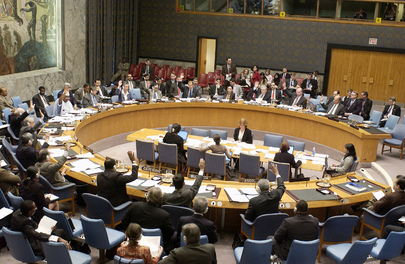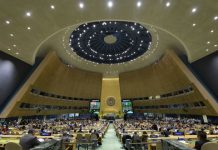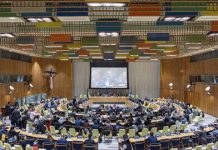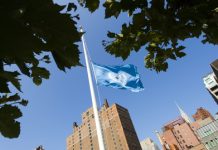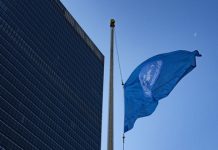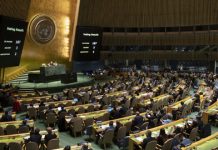Conor Lennon This is Conor Lennon from UN News. On Wednesday, October the 30th. Navi Pillay, the chairperson of the UN Independent International Commission of Inquiry on the occupied Palestinian territory, including East Jerusalem and Israel, presented the findings of its report to the UN General Assembly. The authors found that Israel perpetrated a policy to destroy Gaza’s health care system as part of a broader assault, committed war crimes and deliberately attacks medical personnel and facilities. The report goes on to conclude that Israel and Palestinian armed groups are responsible for torture and sexual and gender-based violence, and that Israeli security forces have deliberately killed, detained and tortured medical personnel. Ahead of her appearance at the General Assembly. I sat down with Ms. Pillay in the UN news studios and started by asking her to recall one of the many harrowing cases in the report the killing of Hind Rajab, a five-year-old girl and her extended family, as well as the paramedics who tried to rescue her.
Navi Pillay You know, when we prepared these reports, then our team, it’s a small team, nevertheless, they spend hours looking at all the footage. So it struck us that this little 5 or 6 year old spent so much time appealing for help. And then she and the two paramedics in the ambulance were killed. So we, you know, we can’t investigate every issue and we’re not allowed on the ground in Israel. But this one, we particularly investigated and were able to establish that there was a Israeli unit right in that area. We named the unit. The Israeli security forces at first acknowledged that they were present. They put out such a notice on their website and then quickly withdrew it. When we investigate, yeah, we’re able to capture stuff before it’s deleted, and we work with the entire U.N. system. So, we have the experts of forensics, satellite footage and all that. And, therefore, our report has facts that have been verified. We looked at the child because it’s such a crime, not only a war crime, but could well amount to genocide, the targeted killing of children. And it has to be investigated. That’s our first call. We, the United Nations, is able and willing to go in there and investigate it, but we’re not allowed to. So, you asked why we focused on this particular child. Yeah. There’s a name to this child. Otherwise, we’re busy talking about 20,000 children and so on. If it registered so much, it would me and my team just watching this child with their plea to be given the right to live, it was taken away from. It’s considered an extremely serious crime under international law. And when you put it all together and thousands of children are involved, it amounts to serious crimes. We not only investigate these incidents and other complaints for the purpose of delivering a report at the United Nations. We share information at the request of the prosecutor of the International Criminal Court and with the with lawyers, for instance, the lawyers from South Africa who are arguing that genocide had occurred. And that’s why we’re very careful about the information. If we can investigate one incident of the killing of a child thoroughly and we can, then we proceeded to do so.
Conor Lennon War crimes documented, not like a random occurrence or several random occurrences: you say a concerted policy. Why do you say it’s a concerted policy?
Navi Pillay When you put the mass of evidence together, it’s not just the numbers who have been killed, but the way children have been killed, for instance, with bullets, appeared to have struck them in the chest and the head, not just on the limbs, not while they were running away or something. You know, I have so much experience of of killings in the Rwandan genocide. So, there it was all the hacking of the ankles to stop them from running. And in that case, we drew inferences from the wounds themselves. What did they tell us about the intentional killing? And this is what this tells us also, that it points to evidence of serious crimes and with the intention to carry out those crimes maybe orders given from above. Sometimes we can trace these orders as well because of the submissions we receive, we call for submissions they pull in from people inside Israel, and elsewhere from former soldiers. So, we do get a lot of information. Obviously, it’s not ideal. We could do a full and better job if we were on the ground investigating. But absent that we ensure that what we find is reliable. It may not be the entire picture, but whatever we focus on, we try and make sure that we clarify what occurred there.
Navi Pillay You mentioned Rwanda. There’s a different media environment now, particularly when it comes to online mis and disinformation. And you mentioned you are not on the ground. You also mentioned the forensic level of work that’s done. Are you confident that it’s clear enough to those who are seeing this report that this isn’t just more misinformation, this isn’t just wild conspiracy theory, that the claims you make in the report are all verifiable and verified?
Navi Pillay A legitimate criticism of our report, maybe you haven’t presented a full picture. Thousands more hundreds more were killed. True. We haven’t had access to all the information. We may have missed some of them. We will if we come across individuals who have been tortured, killed, children who have been killed, we will investigate them. So that points a little bit to the reliability that where we focus on an incident, we only include it in our report once we’ve verified that. Here and there, you’ll find in our report where we say we were unable to verify this. You know, honestly, Conor, it’s where allegations are made by the Israeli security forces that we say, all right, you say there were tunnels under the hospitals: well, we could not verify that. Maybe that is something we can only verify if we get to the ground. At other times, statements they make are just not true. And therefore, we said, well, all right, so we cannot verify this at the moment. We give you the benefit of the doubt. But can we have an opportunity to verify this? The verification process, I’m confident, is quite thorough because we have the expertise from the entire U.N. helping us there.
Navi Pillay There is such a flood of mis and disinformation, and some of it goes extremely viral. Do you have discussions internally about how you can combat that in terms of getting the amount of coverage for your findings in your report over these wild and often untrue but very visible assertions that are made online?
Navi Pillay As I say, we do our best. Some are glaringly false. The early, early on, after October 7th, there were allegations of babies being the heads chopped off and they were burnt. That that was verified as untrue. It didn’t happen. It was false. Wherever we can, we tend to establish that. I readily acknowledge it’s difficult to do so in all cases. But we, being a commission, whose report is relied on by courts, have a responsibility to make sure that we do not just pick up anything and everything that appears in social media. Just because something appears multiple times, that therefore it must be true.
Navi Pillay Now, the Commission calls on the government of both Palestine and the de facto authorities in Gaza to, in the words of the report, thoroughly and impartially, investigate and prosecute violations of international law. How much hope do you have that they will listen?
Navi Pillay Well, we must make that call because they are under an obligation to do so. I don’t have much hope that they will do so now in the middle of conflict. But the call is there, and it’s a very serious call which the ICJ expects them to do. ICJ has also reminded states of their obligations. The even the International Criminal Court, the first responsibility is for the authority concerned to investigate and bring perpetrators to justice, and only if they are unwilling or unable, then the International Criminal Court steps into. On that same principle, we make this call. A serious call to, this is a violation, we’re drawing it to attention, so they can’t say they didn’t know about it.
Source of original article: United Nations (news.un.org). Photo credit: UN. The content of this article does not necessarily reflect the views or opinion of Global Diaspora News (www.globaldiasporanews.com).
To submit your press release: (https://www.globaldiasporanews.com/pr).
To advertise on Global Diaspora News: (www.globaldiasporanews.com/ads).
Sign up to Global Diaspora News newsletter (https://www.globaldiasporanews.com/newsletter/) to start receiving updates and opportunities directly in your email inbox for free.


